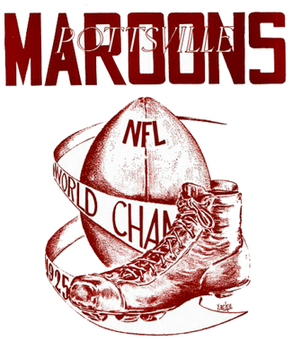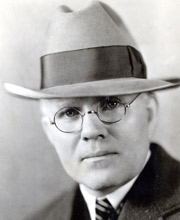Related Research Articles

The Arizona Cardinals are a professional American football team based in the Phoenix metropolitan area. The Cardinals compete in the National Football League (NFL) as a member of the National Football Conference (NFC) West division, and play their home games at State Farm Stadium in Glendale, a suburb northwest of Phoenix.

The Pottsville Maroons were an American football team based in Pottsville, Pennsylvania, in the northeastern part of the state. Founded in 1920, they played in the National Football League (NFL) from 1925 to 1928. In 1929 they relocated to Boston, where they played one season as the Boston Bulldogs.
The Milwaukee Badgers were a professional American football team, based in Milwaukee, Wisconsin, that played in the National Football League from 1922 to 1926. The team played its home games at Athletic Park, later known as Borchert Field, on Milwaukee's north side. The team was notable for having many African-American players for the time.

Joseph Francis Carr was an American sports executive in football, baseball, and basketball. He is best known as the president of the National Football League from 1921 until 1939. He was also one of the founders and president of the American Basketball League (ABL) from 1925 to 1927. He was also the promotional director for Minor League Baseball's governing body from 1933 to 1939, leading an expansion of the minor leagues from 12 to 40 leagues operating in 279 cities with 4,200 players and attendance totaling 15,500,000.
Charles W. "Charley" Bidwill Sr. was an owner of the National Football League (NFL)'s Chicago Cardinals. He owned the team for 14 seasons, from 1933 through 1946. Bidwell was inducted into the Pro Football Hall of Fame in 1967.
The 1925 NFL season was the sixth regular season of the National Football League. Five new teams entered the league: New York Giants, Detroit Panthers, Pottsville Maroons, Providence Steam Roller, and a new Canton Bulldogs team. The Kenosha Maroons folded, with the Racine Legion and Minneapolis Marines mothballing.

John Victor McNally, nicknamed "Johnny Blood", was an American football player and coach. McNally was named a member of the NFL 1930s All-Decade Team and was inducted into the Pro Football Hall of Fame as a player in 1963, as one of the Hall of Fame's 17 charter members. McNally played for six different teams between 1925 and 1941, with his longest tenure being with the Green Bay Packers, first from 1929–33 and then from 1935–36. McNally served in the United States Army Air Corps during World War II. Following the war he attempted to return to football in 1945, but an injury ended his playing career.

James Gleason Dunn Conzelman was an American football player and coach, baseball executive, and advertising executive. He was inducted into the Pro Football Hall of Fame in 1964 and was selected in 1969 as a quarterback on the National Football League 1920s All-Decade Team.
Urban Prep Charter Academy succeeded Englewood High School, Englewood Technical Prep Academy and TEAM Englewood Academy High School in Chicago. Englewood was a public four-year high school located in the Englewood neighborhood on the South Side of Chicago, Illinois, United States. Opened in 1874, Englewood was owned and operated by the Chicago Public Schools (CPS) system. Englewood High School closed in 2008. The building is occupied by school in the Urban Prep Academy network. The school is a public charter high school for young men that opened in 2006.
The first American Football League (AFL), sometimes called AFL I, AFLG, or the Grange League, was a professional American football league that operated in 1926. It was the first major competitor to the National Football League (NFL). Founded by Charles "C.C." Pyle, (1882–1939), and General Charles X. Zimmerman, (1865–1926), as vice president and starring Hall of Fame halfback Harold Edward "Red" Grange, (1903–1991), the short-lived league with nine teams competed against the more established – then six-year-old – NFL, both for players and for fans. While Pyle's and Grange's New York Yankees team and the already established Philadelphia Quakers became reliable draws, the lack of star power and the uncertain financial conditions of the other seven teams led to the league's dissolution after one season.

The 1925 National Football League (NFL) Championship, claimed by the Chicago Cardinals, has long been the subject of controversy, centering on the suspension of the Pottsville Maroons by NFL commissioner Joseph Carr, which prevented them from taking the title. The Maroons were one of the dominant teams of the 1925 season, and after defeating the Chicago Cardinals 21–7 on December 6, they came away with the best record in the league. However, Carr suspended and removed the team from the NFL after they played an unauthorized exhibition game in Philadelphia, on the grounds that they had violated the territorial rights of the Frankford Yellow Jackets. Chicago played and won two more games against weak NFL opponents, but were sanctioned because Cardinals player Art Folz hired four Chicago high school football players to play for the Milwaukee Badgers under assumed names to ensure a Cardinals victory.
Anthony H. Latone was an American football player of Lithuanian descent who played six seasons in the National Football League (NFL). Although he never attended college, he is unofficially considered the leading rusher of 1920s. During the six seasons he played in the NFL, Latone out-rushed and outscored the Pro Football Hall of Fame's Red Grange, despite playing 30 fewer games. He was also one of the very few known persons to knock Grange out of a game. Grange later said that, "even though George Halas was paying me, 500 bucks to barn storm the nation, it wasn't enough to be hit by the likes of Latone."
The 1925 Milwaukee Badgers season was their fourth in the National Football League. The team failed to improve on their previous league record of 5–8, losing all their games. They tied for sixteenth place in the league.
John Frederick Bryan was a professional football player for the Chicago Cardinals, Chicago Bears, and Milwaukee Badgers. He was also a player-coach and franchise owner of the Badgers in 1925 and 1926.
Christopher O'Brien was a Chicago, Illinois house painter and plumber who became a pro football franchise owner. He is mostly known as the owner of the Chicago Cardinals, and has been called the "Father of Professional Football in Chicago". O'Brien was also a co-founder of the American Professional Football Association by representing the Cardinals at the September 17, 1920, league meeting at Ralph Hay's Hupmobile dealership in Canton, Ohio.
The 1925 Chicago Cardinals–Milwaukee Badgers scandal was a scandal centered on a 1925 game between the Chicago Cardinals and the Milwaukee Badgers of the National Football League. The scandal involved a Chicago player, Art Folz, hiring a group of high school football players to play for the Milwaukee Badgers against the Cardinals. This would ensure an inferior opponent for Chicago. The game was used to help prop up their win–loss percentage and as a chance of wresting the 1925 Championship away from the first place Pottsville Maroons.
Arthur F. Folz a.k.a. Art Foltz was a professional American football player who played with the Chicago Cardinals of the National Football League (NFL) from 1923 to 1925. He is best known for his role in the 1925 Chicago Cardinals–Milwaukee Badgers scandal, where Folz hired a group of high school football players from his alma mater, Chicago's Engelwood High School, to play for the Milwaukee Badgers, against the Cardinals. During the recruitment, Folz reportedly told the high schoolers that the game was a "practice game" and would in no part affect their amateur status.
Ambrose McGuirk was the first owner of the Milwaukee Badgers of the National Football League. He is best known for being ordered to sell the Badgers for his role in the 1925 Chicago Cardinals-Milwaukee Badgers scandal, in which four Chicago-area high school football players were employed by the Badgers for one game, a 59-0 loss against the Chicago Cardinals. When the scandal was discovered by NFL president Joe Carr, McGuirk was ordered to sell his Milwaukee franchise within 90 days. However Carr later decided that the penalty on McGuirk was too harsh and rescinded his earlier order. However by this time McGuirk had already sold the franchise to Chicago Bears fullback, Johnny Bryan.

The National Football League commissioner is the chief executive officer of the National Football League (NFL). The position was created in 1941. The current commissioner is Roger Goodell, who assumed office on September 1, 2006.

The professional American football team now known as the Arizona Cardinals previously played in Chicago, Illinois, as the Chicago Cardinals from 1898 to 1959 before relocating to St. Louis, Missouri, for the 1960 through 1987 seasons.
References
- ↑ Joe Horrigan (1984). "Joe Carr" (PDF). Coffin Corner. Professional Football Researchers Association. 6 (5–6): 1–4. Archived from the original (PDF) on November 27, 2010. Retrieved August 14, 2009.
- ↑ Chris Willis (2003). "Joe Carr VisionU" (PDF). Coffin Corner. Professional Football Researchers Association. 25 (5): 1–3. Archived from the original (PDF) on December 18, 2010.
- ↑ Fleming, David (2007). Breaker Boys: The NFL's Greatest Team and the Stolen 1925 Championship . ESPN. ISBN 1-933060-35-2.
- ↑ Bob Carroll. "Red Equals Green" (PDF). Coffin Corner. Professional Football Researchers Association: 1–6. Archived from the original (PDF) on March 26, 2012.
- ↑ "Ghosts of the Gridiron: Cardinals Refuse Title Shared With Pottsville". Archived from the original on March 2, 2012. Retrieved October 4, 2006.